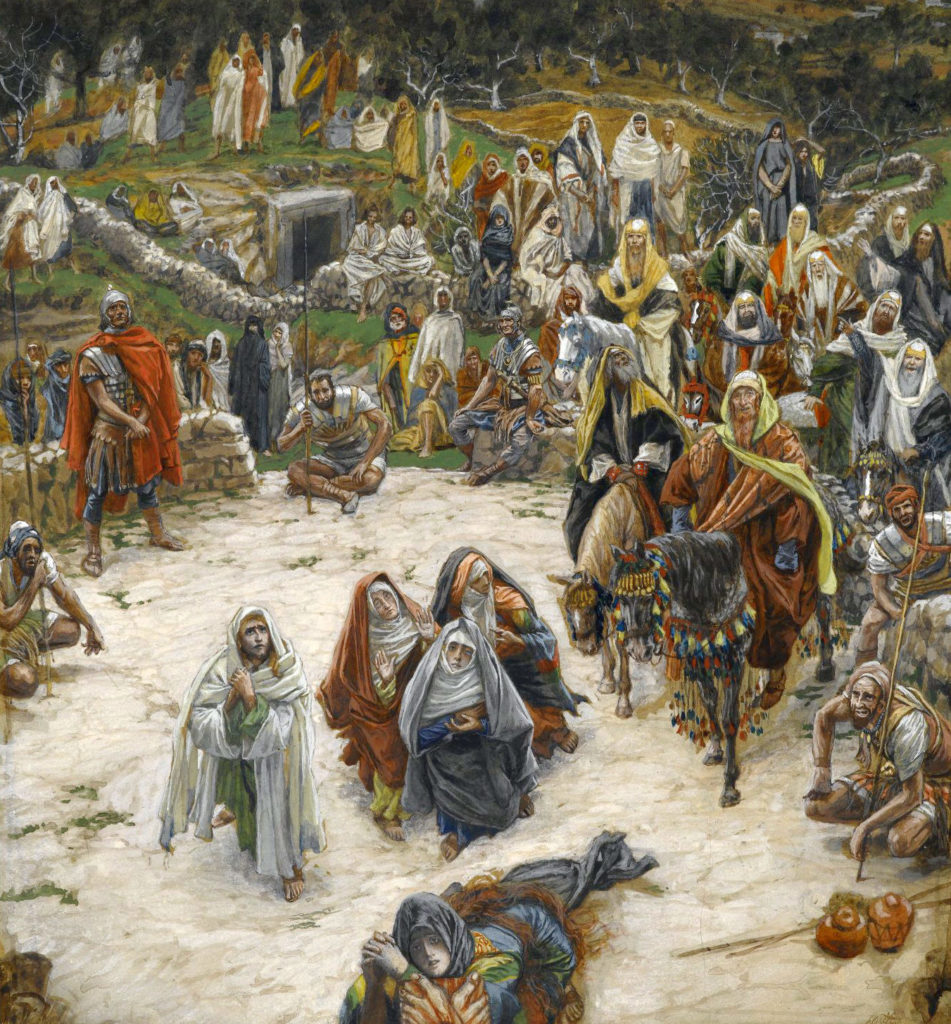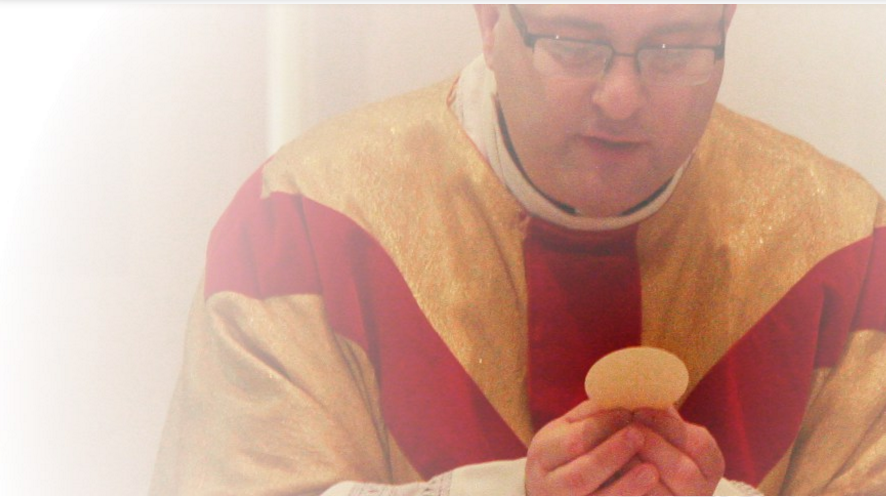The symbol (Jesus washing the Apostle’s feet) of love is mingled with the symbol of purity, so that we may learn that where true love is, there also is the assembly of saints. Jesus does not need to be purified, but He humbles Himself and He loves. He gives an example of every virtue. By this act, He affirms that the enemy of love is pride, and that the enemy of all good is the refusal to love. Humility and charity are the foundation and the crown respectively of the spiritual edifice which He intends to erect, both in the individual and in the human race. And the Cross, too, which supports this edifice, is as humiliating as it is painful; but when the work is accomplished it will be glorious as the instrument of union and the source of bliss. Every thing is there. All is in the Cross, because all is in humility and love, and the washing of the feet is the herald of the Cross. –-Father A. G. Sertillanges ‘What Jesus Saw From the Cross’
Monthly Archives: October 2016

View From the Cross
Such a transformation means death,
if you will,
but a glorious death,
a death which in reality is survival,
in which all those souls that freely submit,
all the authorities that accept the metamorphosis,
are crowned with the glory of a higher and nobler condition.
Father A.G. Sertillanges
‘What Jesus Saw From the Cross’

James Tissot ‘What Our Lord Saw From the Cross’ (‘Ce que voyait Notre-Seigneur sur la Croix’)

Refinement
Stripped bare to the bone, still bleeding,
Slow the process, less needing,
Beyond healing, on into salvation,
Reduced obsession, trusting beatification,
Content within longing superseding,
Removing the heartbreak of chaotic feelings,
The numbness within childish dreams overwhelming,
Reared, raised, and fettered, growing amongst a multitude of endeavors,
Knowing no better, progressing agitated on through simple grace,
Understanding immensity, the omnipresence, presented within sanctifying grace,
Confusing, alluring, enticing, refreshing, continuously quiet meditation,
Discarded masks aplenty, rejected desperate costuming, complexity of layers refusing,
No self-promoting adulation, no individual praise, no self-appointed grandeur, no self-sustaining ways, no avenues to false wisdom,
Shutdown, seriously hampered, no ripples nor continuing waves,
Worldly approval rebuked, rejected subtle invasions of perceived glory, rewarding the detached reality of renouncement,
Repentance immediate, the patience within profound imperfection, needing no longer dramatics,
Hysterical dancing in stillness, the slow movement of chaotic thoughts contently let go,
Everything continues, nothingness underlying, something greater patient and kind,
Let it be, whispered words of wisdom forgotten, let it be, let it be,
Accordance, congruity the reflecting attempt prevailing within fortitude,
Nasty disposition emerging, ornery centering upon intentional irritation, denunciation, promoting isolation,
Content in the practice of prayer, left alone within divine intimacy, satiated, further refinement still needed, no need to push away,
Unprofitable servant experiencing obligation, nothing more, nothing needing undone, doing what only needs done,
Lord keep on working, Lord keep pursuing, allow the advancement of placing attentively my hand upon my mouth,
Grant me the courage to silence myself, the will to acquiesce without battle, the abandonment of righteous refusal, the sterility of establishing religious credentials,
Knowing surrender within moments, followed by moments, reposing quaintly on into perpetual holy salutation immersed in the Cross,
Lord keep me close, the awareness of a divine image and likeness coalescing with original sin, an individual bereft,
Humbled by everything seen, by everything thought and done, experiencing the pain of wandering away,
Grace the receiving, grace the receding, grace the emptiness of restrained desperation, the lack of effort resounding,
The sound of a destitute lack of rhyming and scheming, left alone breathing, beyond the Quietest, no emptying, no effort, on into the loving arms of a Savior,
The Eucharist abiding, always waiting, standing tall while emanating, temper the refrain of every return to profound calming,
You who was, is, and still to come, announce the welcome of every tear fallen from heaven, the removal of vanity blinding the submission,
Make sense of the nonsensical within the strife of division, the divide of impermanence calling forth grand derision,
Lord make me simple, humble, lacking self-consciousness,
The crazed constant looking about, the feelings of woundedness, the reality of brokenness, accepted, released, unburdeneded, unphased by the inevitable slip, trip and fall.
Lord grace the awareness of You within every breath while breathing ‘bring me home for eternity’.

St Teresa of Avila: God’s revolutionary
Teresa was a religious of only one cause, the only one of any religious: perfection, and for such divine purpose she offered herself, the testimony of her life, her hidden and bare humanity as the book where everyone, either woman or man, red or white, could find the utter truth behind every atom of reality. With this intellectual as well as spiritual sacrifice, she is not only undertaking the path of the Cross where Christ set out the wounds of his flesh as a testimony of a renewed human dignity, but also the example of the great Doctors and teachers of the Church: She dialogued with the world as St. Augustine did in his platonic style confessions (clearly shown in The Book of the Life); she imitated the love of St. Jerome for the scriptures and his Christological exegesis; who could be unaware of the similarities between her treatment of the virtues and that of St. Thomas Aquinas (especially in The Way of Perfection)? The doctrine of Teresa is not something “new” like those of the sixteenth century reformers, but a sublime actualisation of the same message, the very Good News which only revolutionary attempt finds its goal in the human spirit.
If someone wants to be “authentically” revolutionary, the best way to pursue this desire would be attending the God’s call towards a deep conversion of the very heart and human’s nature, and for such heroic work, perhaps there couldn’t be a better “red book” than the writings of St. Theresa of Avila. Godzdogz: Dominican Friars – England & Scotland post by Br Rafael Jimenez O.P.


Abandonment
To render abandonment (holy) possible, we have first to establish ourselves in holy indifference, and then to maintain ourselves in that state by the assiduous practice of Christian mortification. This is the labor of a lifetime.
……
….abandonment (is) “a cluster or assemblage of acts of faith the most perfect, of hope the most complete and confident, of love the purest and the most loyal.” Abbot Vitalis Lehodey “Holy Abandonment”


Father and Child reunion
“Praised be the Lord,” said the priest and placed the candlestick on the table. Goldmund murmured the response, staring straight ahead.
The priest said nothing. He waited and said nothing, until Goldmund grew restless and searchingly raised his eyes to the man in front of him.
This man, he now saw to his confusion, was not only wearing the habit of the fathers of Mariabronn, he also wore the insignia of the office of Abbot.
And now he looked into the Abbot’s face. It was a bony face, firmly, clearly cut, with very thin lips. It was a face he knew. As though spellbound, Goldmund looked into this face that seemed completely formed by mind and will. With unsteady hand he reached for the candlestick, lifted it and held it closer to the stranger, to see his eyes. He saw them and the candlestick shook in his hand as he put it back on the table.
“Narcissus!” he whispered almost inaudibly. The cellar began to spin around him.
“Yes, Goldmund, I used to be Narcissus, but I abandoned that name a long time ago; you’ve probably forgotten. Since the day I took the vows, my name has been John.”
Goldmund was shaken to the roots of his being. The whole world had changed, and the sudden collapse of his superhuman effort threatened to choke him. He trembled; dizziness made his head feel like an empty bladder; his stomach contracted. Behind his eyes something burned like scalding sobs. He longed to sink into himself, to dissolve in tears, to faint.
But a warning rose from the depths of the memories of his youth, the memories that the sight of Narcissus had conjured up: once, as a boy, he had cried, had let himself go in front of this beautiful, strict face, these dark omniscient eyes. He could never do that again. Like a ghost, Narcissus had reappeared at the strangest moment of his life, probably to save his life—and now he was about to break into sobs in front of him again, or faint? No, no, no. He controlled himself. He subdued his heart, forced his stomach to be calm, willed the dizziness out of his head. He could not show any weakness now.
In an artificially controlled voice, he managed to say: “You must permit me to go on calling you Narcissus.”
“Do, my friend. And don’t you want to shake my hand?”
Again Goldmund dominated himself. With a boyishly stubborn, slightly ironic tone, like the one he had occasionally taken in his student days, he forced out an answer.
“Forgive me, Narcissus,” he said coldly and a trifle blasé. “I see that you have become Abbot. But I’m still a vagrant. And besides, our conversation, as much as I desire it, won’t unfortunately last very long. Because, Narcissus, I’ve been sentenced to the gallows, and in an hour, or sooner, I’ll probably be hanged. I say this only to clarify the situation for you.”
Narcissus’s expression did not change. He was much amused by the boyish boasting streak in his friend’s attitude and at the same time touched. But he understood and keenly appreciated the pride that kept Goldmund from collapsing tearfully against his chest. He, too, had imagined their reunion differently, but he had no objection whatsoever to this little comedy. Goldmund could not have charmed his way back into his heart any faster.
“Well yes,” he said, with the same pretended casualness. “But I can reassure you about the gallows. You’ve been pardoned. I have been sent to tell you that, and to take you away with me. Because you cannot remain in this city. So we’ll have plenty of time to chat with each other. Now will you shake my hand?”
Hermann Hesse ‘Narcissus and Goldmund’ Chapter 17.

Fade into You



Recent Comments